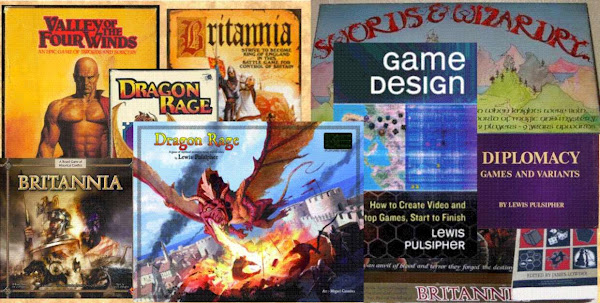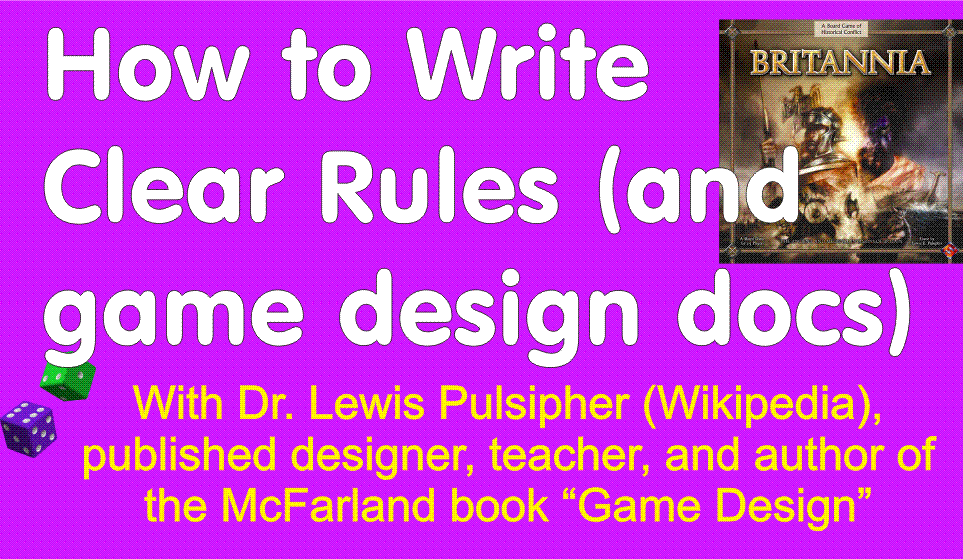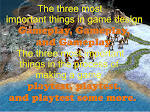Following is the text of the slides.
Game Design: “Don’t Make Me Think”?
Dr. Lewis Pulsipher
Pulsiphergames.com
“Game Design” channel on YouTube
Thanks to Steve Krug
There's a well-known book about website usability by Steve Krug titled "Don't Make Me Think“
He means, don’t make people have to think to find things on websites
Most games involve some thinking, but we can adopt this motto to mean, don't make players think about anything other than the gameplay of the game
Unfortunately, it can also mean, not thinking at all, and that attitude is becoming more common in hobby gaming
It’s always been the norm in party and family games
So we have three meanings
First is wholly desirable: don’t make people think about the interface and how they manipulate the game
Manipulating the game should be second nature
Second is “the way it is”, though I don’t like it: don’t make people have to think when they play a game
This is already rampant in video games, with many being “athleticware” rather than “brainware”
Athleticism, physical skills, dominate in athleticware
Many F2P games have become reward-based rather than consequence-based
Third is what I first referred to, make people think only about gameplay
1) Don’t make me think about the Interface
The interface is how the player tells the game what he/she does, and the game tells the player what happens
Manipulating the game should be second nature from very early on, players should not need to struggle with the interface
Players of tabletop games shouldn't have to remember "every third turn" (and the computer should take care of that for video games)
Players shouldn’t have to do arithmetic unless it's necessary to good gameplay. Players shouldn't have to remember odd aspects of victory conditions unless it's necessary to the game
This is why combat lookup tables are frowned upon nowadays, players have to think about something not usually necessary to gameplay
Innovation is often praised in games, but innovation in the interface is dangerous
Because familiarity, not newness, makes interfaces easier
“Intuitive,” when used in conjunction with UI, usually means “familiar”
2) Don’t make people think when they play a game
Many people want to be entertained when they play a game, they don’t want to put in an effort
They are passive rather than active
It’s like watching a tentpole action movie such as “Avengers”
I really like Avengers, but games are different from movies, to me
But to many people, these days, they are not much different
They want to be given things, rewards, not to earn anything
This attitude used to be confined to party and family games, but is now common in hobby games
Less Thinking
There are lots of ways to do this:
Reduce the number of plausible choices for each decision
Reduce the number of decisions
Provide catch-up mechanisms such that people can mostly not pay attention for much of the game, and still have a chance to win
Make it obvious (“transparent”) how you need to play to win
Provide well-signposted “paths to victory”
Dexterity Games
Dexterity games – combining athleticware with brainware
You don’t have to think (or, not nearly as much)
Old codgers and naturally slow folk like me aren’t fans
I used to play Total Annihilation on dead slow in order to enjoy it
That turned it into a thinking game, not a reaction speed game
For example the British card game Snap (standard deck)
The failed collectible game Clout Fantasy involved dexterity
Pitch Car (racing), caroms, lots of other dexterity games
And of course, a great many video games
3) Don’t make me think about anything other than gameplay
Another way to put it: don’t put anything into the game that isn’t important to the strategies of play
A worthy goal, in my estimation
This is important to people who want to earn what they get from a game, rather than be rewarded for participation
This comes back to my motto, "A designer knows he has achieved perfection not when there is nothing left to add, but when there is nothing left to take away." (Antoine de Saint-Exupery)
The other side: “I feel stupid”
The other side of this is whether the game makes the player feel stupid (Jeffro)
That’s OK for “old-time” gamers, for chess players and the like
If they make a mistake, they recognize it and try to do better next time
It’s not OK for people who are waiting to be entertained. They don’t want to feel uncomfortable
It’s the Age of Comfort, after all
People are brought up to avoid any kind of pain or discomfort – to their detriment
Of course, there are lots of gamers somewhere between these extremes
In general, the broader the appeal of your game, the less you can make people think.










